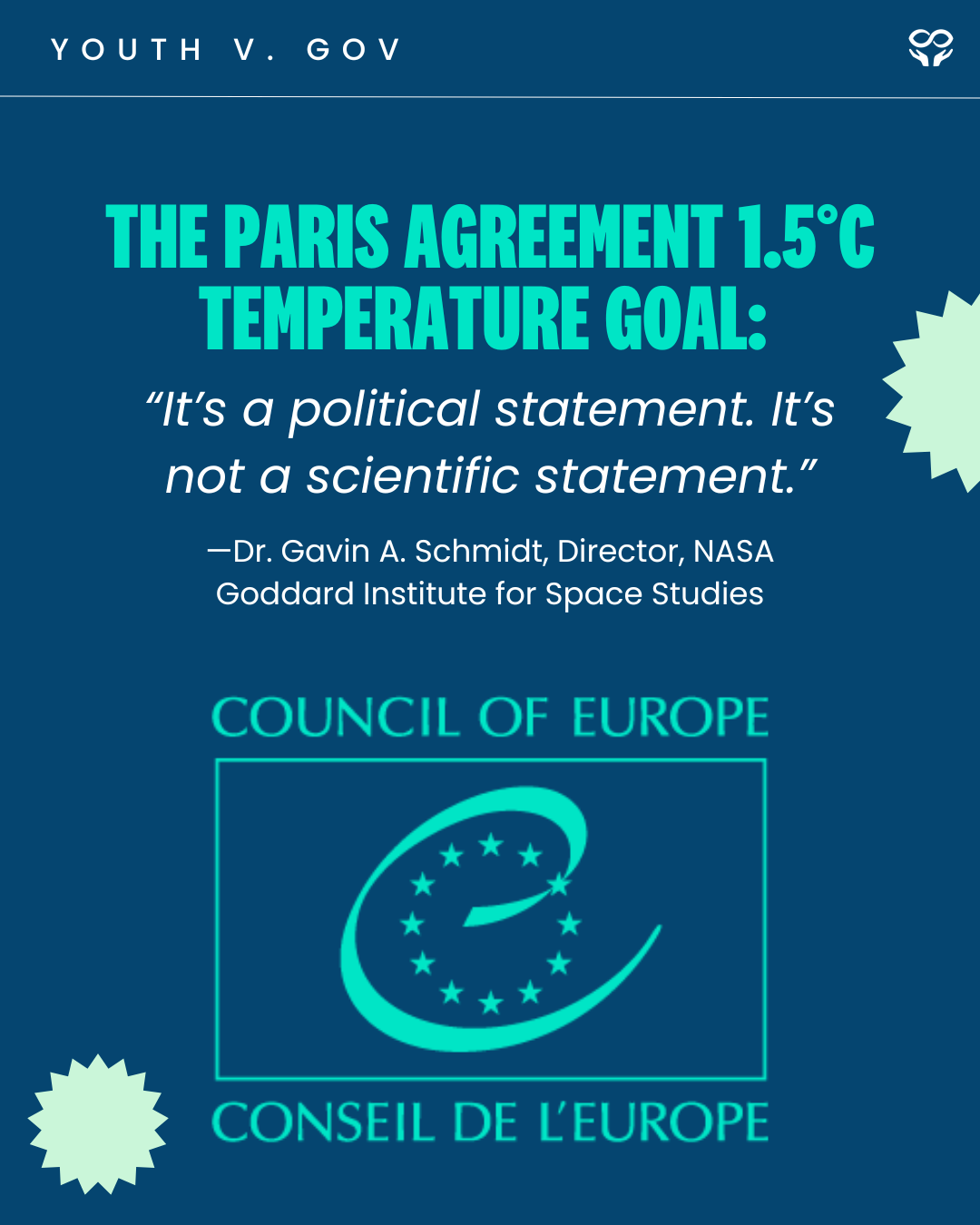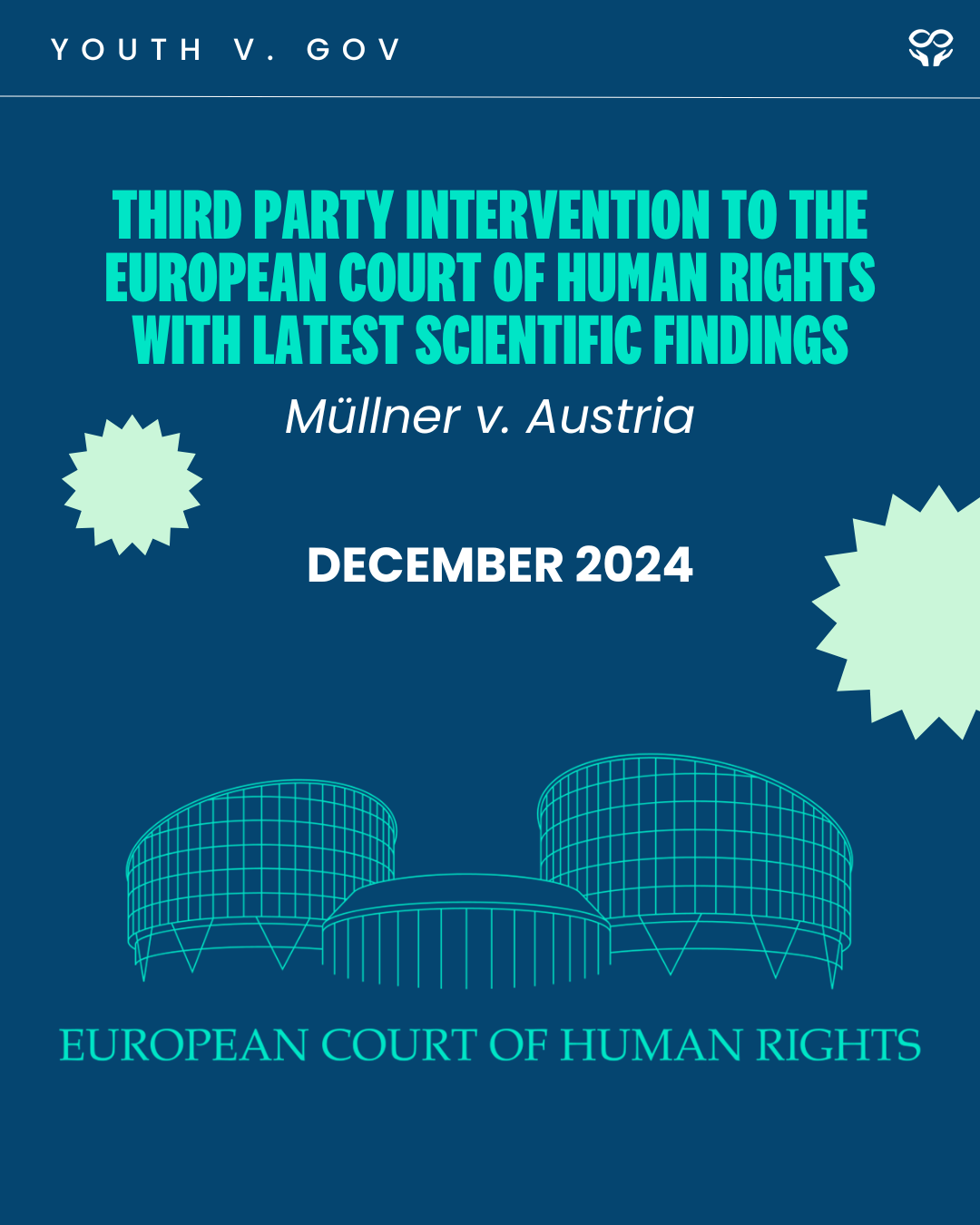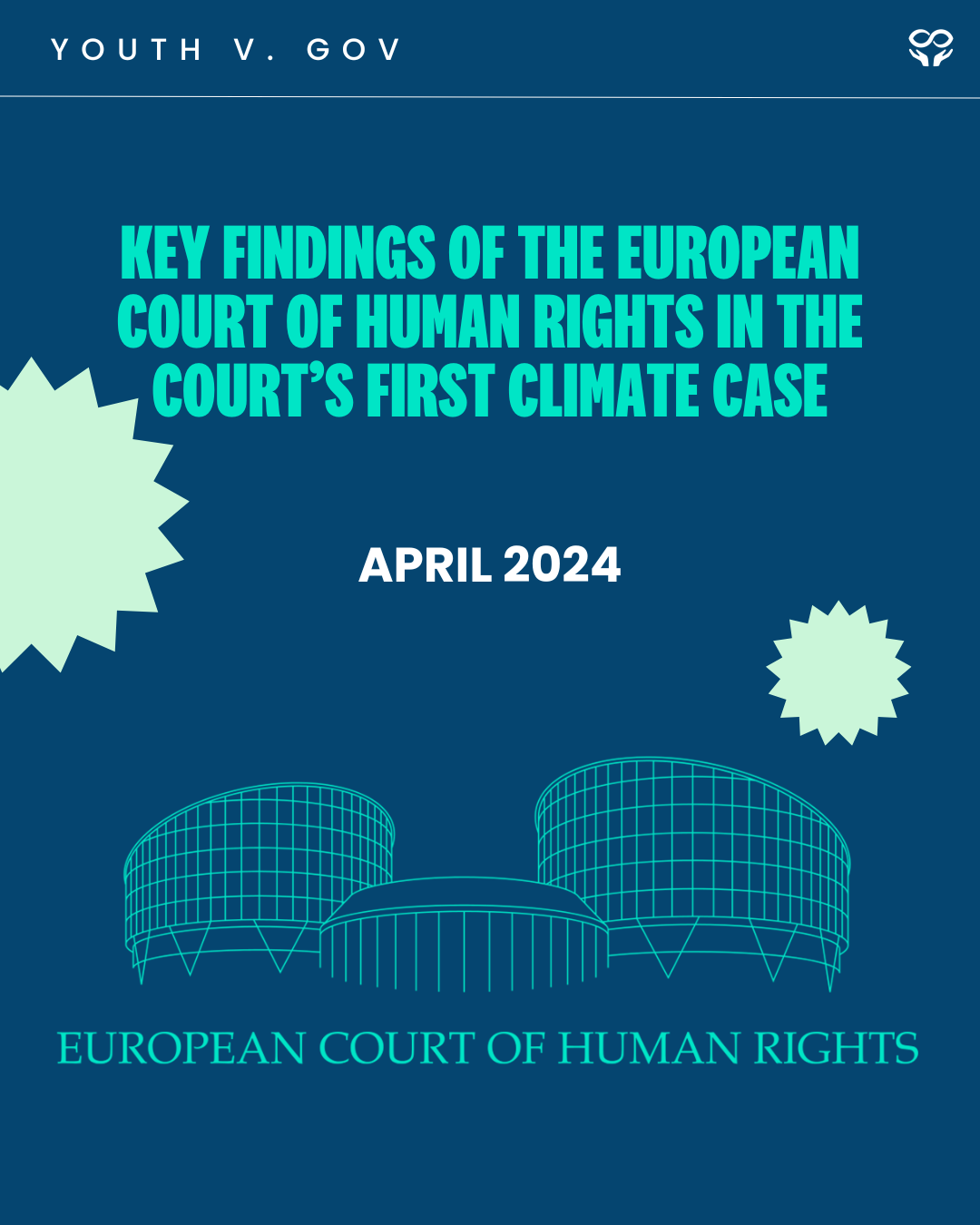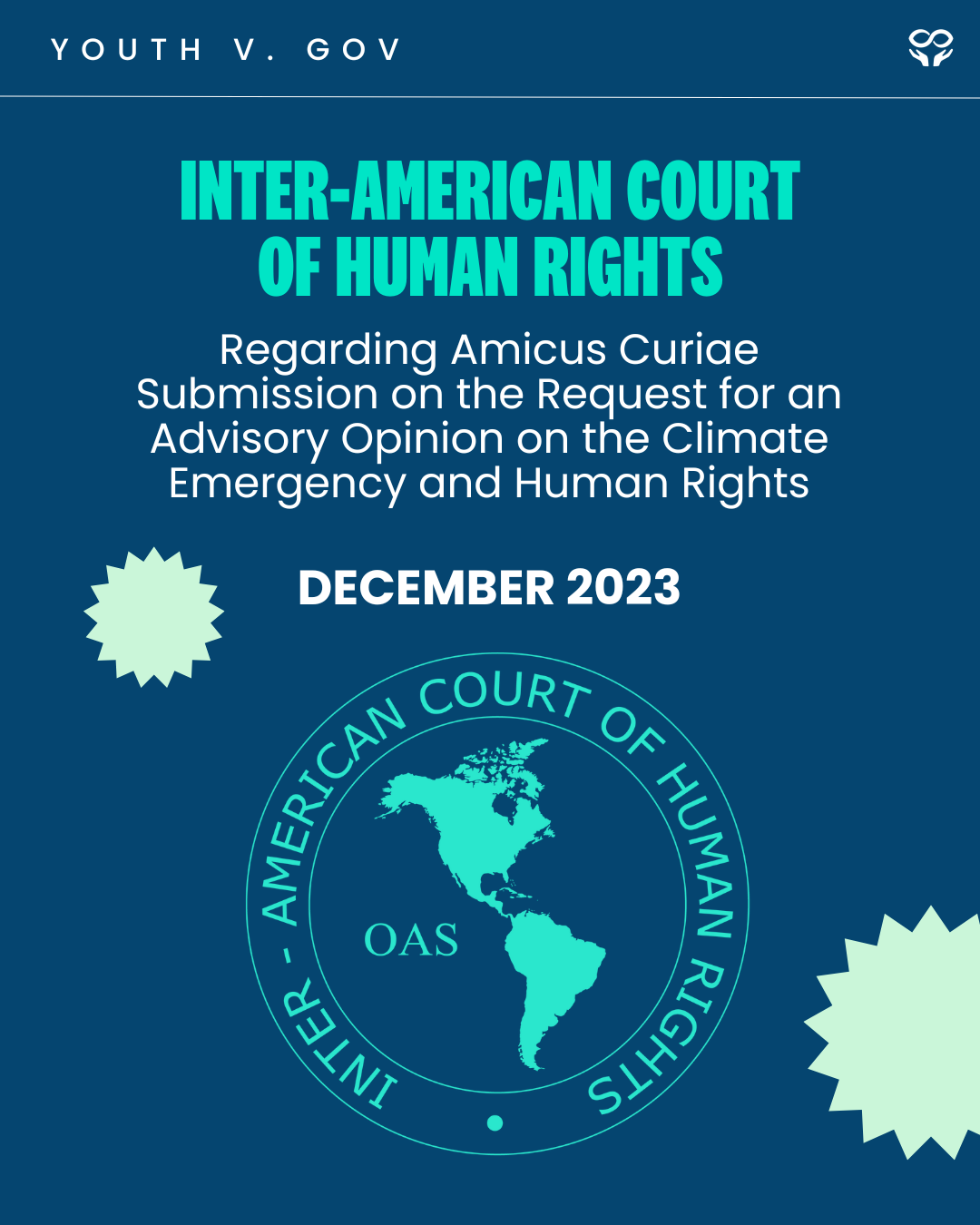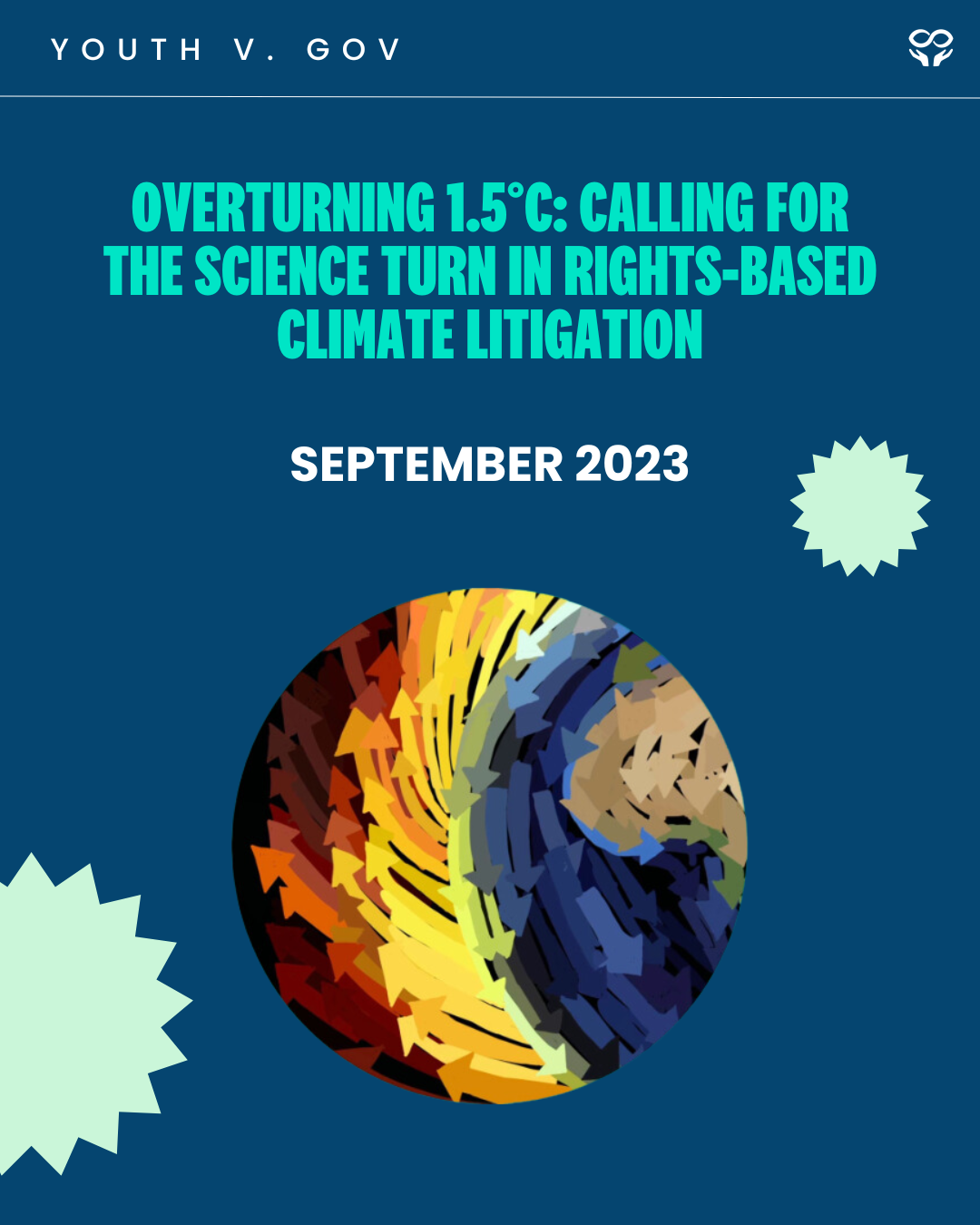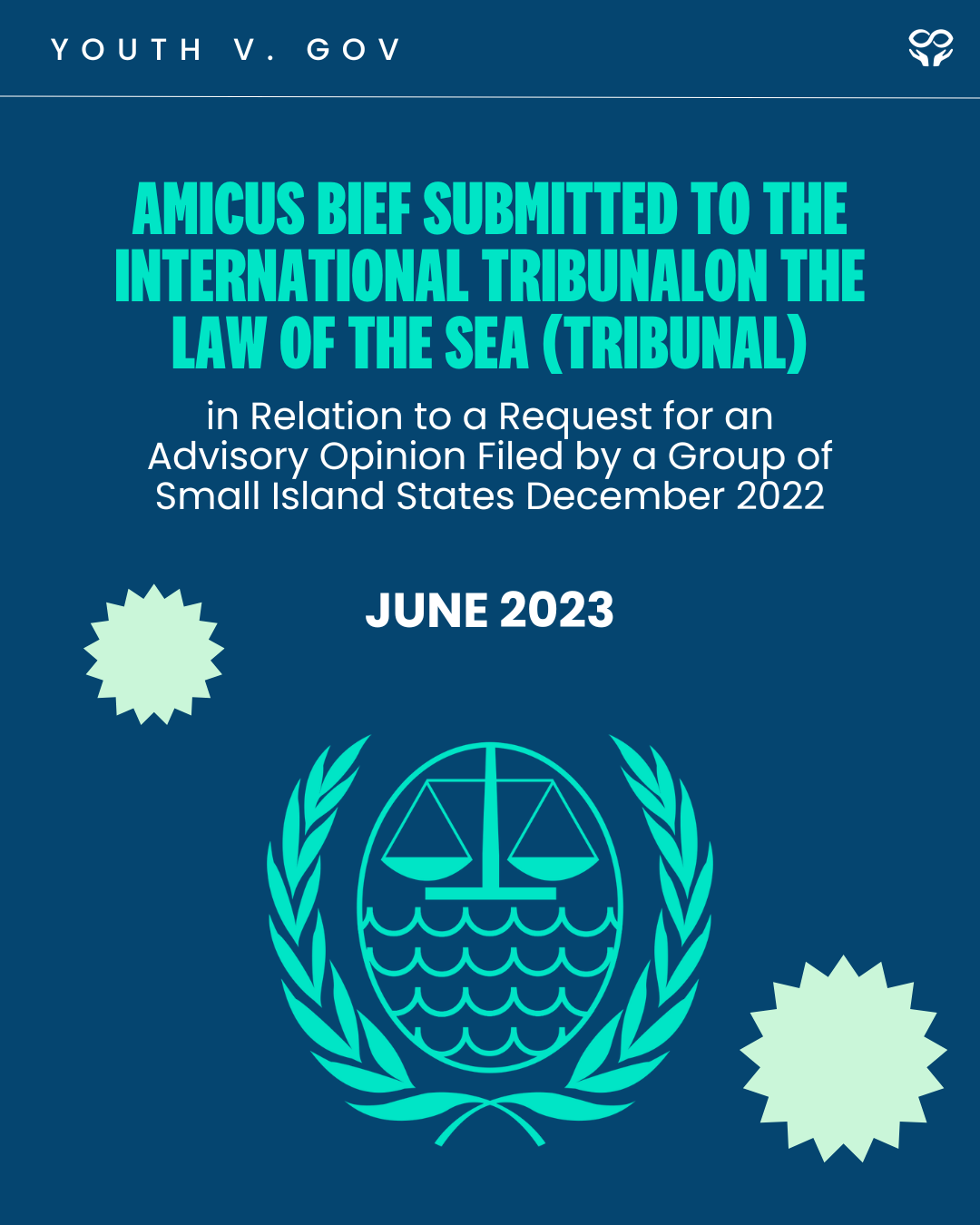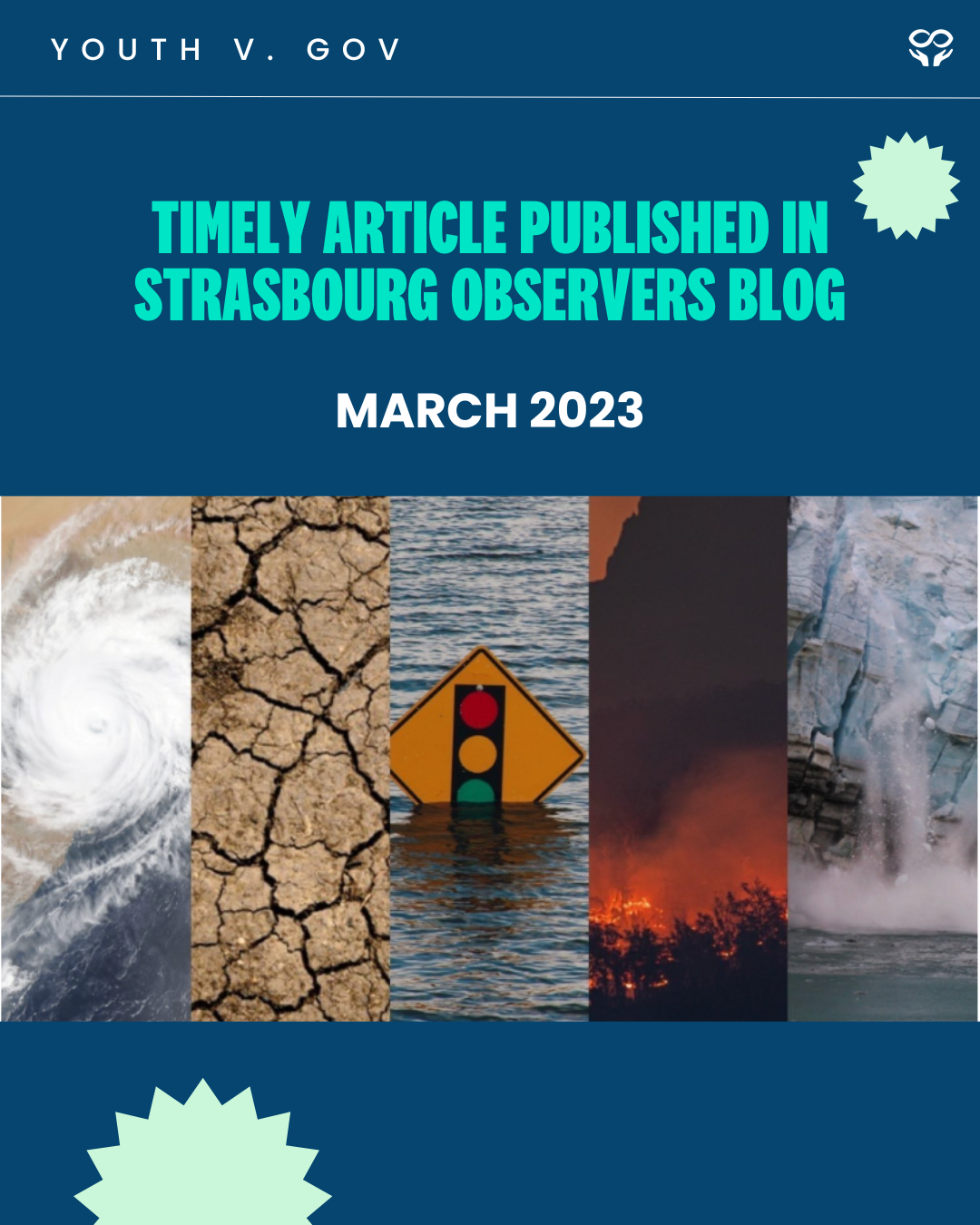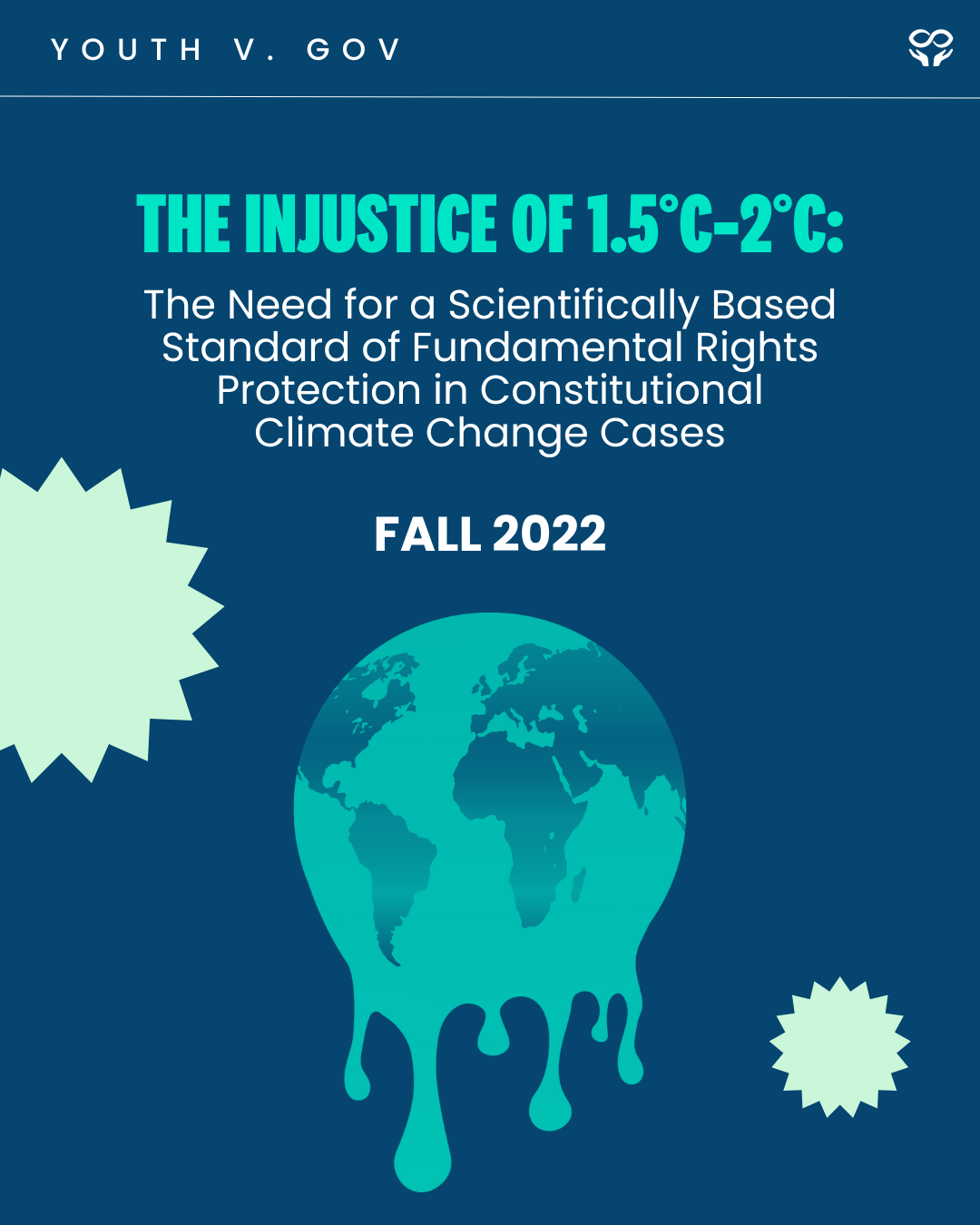Global Legal Submissions and Publications
The legal team at Our Children’s Trust files intervention briefs with international courts, submits reports to inter-governmental orgs, and publishes academic and media articles with the goal of advancing climate legal actions that are based on the best available science.
FEBRUARY 2025
ADHERENCE TO THE PARIS TEMPERATURE GOALS DOES NOT EQUATE TO ADHERENCE TO HUMAN RIGHTS OBLIGATIONS
In KlimaSeniorinnen v. Switzerland, the European Court of Human Rights found, “Bearing in mind that … the global aims as to the need to limit the rise in global temperature, as set out in the Paris Agreement, must inform … domestic policies, it is obvious that the said aims cannot of themselves suffice as a criterion for any assessment of Convention compliance ….” Yet, Switzerland’s proposed actions to comply with the judgment focus heavily on adhering solely to the Paris Agreement. Our Children’s Trust, Oxfam, and the Centre for Child Law, University of Pretoria submitted a communication to the Council of Europe underscoring why, “compliance with the Paris Agreement, does not shield States from the international responsibility that arises from breaching their international human rights obligations.”
Read the communication here. (15 minute read)
DECEMBER 2O24
THE LATEST SCIENTIFIC EVIDENCE SUBMITTED TO THE EUROPEAN COURT OF HUMAN RIGHTS
Just as governments must ground their decisions on how to restore the health of the climate system in the best available scientific evidence, so too must courts. Last spring the European Court of Human Rights issued a historic judgment in KlimaSeniorinnen. The judgment requires governments to set emissions reductions targets based on the best available evidence. Our Third-Party Intervention in Müllner v. Austria—the first climate case before the Court since KlimaSeniorinnen—underscores the vital role of science in climate litigation. It also ensures that the Court has access to the most-up-to-date science, so its forthcoming findings are accurate and conclusions safeguard human rights for all.”
Read the submission here. (16 minute read)
Read the press statement here. (2 minute read)
OCTOBER 2O24
ANSWERING QUESTIONS FROM THE INTER-AMERICAN BENCH: THE SCIENCE-BASED CO2 LIMIT TO PROTECT HUMAN RIGHTS
What is a safe and just level of CO2 in the atmosphere? Turns out the courts want to know as well. During hearings held by the Inter-American Court of Human Rights, concerning the Advisory Opinion on the "Climate Emergency and Human Rights," judges repeatedly sought clarification on the limits and standards needed to protect human rights amid the climate crisis. They asked about “the difference between what was promised in the agreements [… and ...] the standards necessary to address this issue”. They also asked whether the Court should “look beyond” the “minimum standards” set by the UNFCCC, Kyoto Protocol, and Paris Agreement. Despite numerous inquiries, the answers sidestepped the questions. In response, one judge pointedly stated, “The question I would like to have answered emphatically and with greater certainty … is: What is the best science available?” To address the Court’s questions, we drafted, sought the review of scientists, and submitted the answer: 350 ppm.
Read the submission here. (3 minute read)
OCTOBER 2O24
A Promising Framework for Human Rights Protection: Summary of a First-of-Its-Kind Climate Agreement Submitted to Inter-American Court of Human Rights
On October 16th, Our Children’s Trust and the University Network for Human Rights submitted a summary of the first-of-its-kind Settlement Agreement in Navahine v. Hawai‘i Department of Transportation to the Inter-American Court of Human Rights (IACtHR). The submission directly addresses questions raised by the Court during the Public Hearings of the Advisory Opinion on Climate Emergency and Human Rights regarding: (i) the mitigation target necessary and sufficient to protect human rights in the context of climate change; and (ii) the feasibility of achieving zero emissions by 2050. The submission also underscores how the Navahine Agreement could serve as a model for the IACtHR to incorporate into the Court’s forthcoming opinion.
Read the Submission here. (6 minute read)
OCTOBER 2O24
Contribution by Our Children’s Trust to OHCHR’s Call for Input for its Comprehensive Report on Mental Health and Human Rights
“Climate change is a mental health emergency for children.” Consequently, a forthcoming report from the UN Office of the High Commissioner of Human Rights on Mental Health and Human Rights would be incomplete without underscoring the vast array of mental health injuries resulting from climate change, particularly its disproportionate and lifelong harms to children. To ensure the serious and widespread mental health injuries are recognized by high-level UN bodies, we submitted comments to the Office of the High Commissioner in October. Our submission highlights powerful testimony from our youth plaintiffs in Montana and Hawai'i, alongside expert witnesses from those cases and our federal lawsuit, Genesis v. EPA.
Read the Contribution here. (6 minute read)
JUNE 2024
15 International Organizations and 5 Experts File Brief in Support of the Juliana Plaintiffs
Fifteen organizations and five individual experts on climate rights and effective remedies from cities spanning London, UK to Berlin, Germany, Seoul, Korea to Pretoria, South Africa—have united to address the injustice President Biden’s Department of Justice is inflicting on the youth plaintiffs in Juliana v. U.S. They urgently called on the Biden Administration to step up and take meaningful action to protect the lives and futures of these young people, rather than employing obscure legal tactics to deny them justice. In their brief, they emphasized, “It is not too late for the US courts to play a part in the development of a national and global solution for climate change. However, no such contribution can be made while procedural delays cause substantive issues to languish unresolved within the US justice system, preventing meaningful access to justice and effective redress.”
Read the Amici Curiae Brief here. (18 minute read)
APRIL 2024
TESTIMONY AT THE INTER-AMERICAN COURT OF HUMAN RIGHTS ADVOCATING FOR BEST AVAILABLE CLIMATE SCIENCE TO PROTECT CHILDRENS’ RIGHTS
On April 23, 24, and 25, 2024, in Bridgetown, Barbados, Kalālapaikuanalu Winter, a 20-year-old Native Hawaiian and youth plaintiff in Navahine v. Hawai‘i Department of Transportation and attorney Kelly Matheson with Our Children’s Trust, along with the backing of 21 youth and 18 pediatric associations representing over 1 million medical professionals in more than 120 countries—testified before the Inter-American Court of Human Rights (IACtHR) about the harrowing effects of climate change on children across the globe and what humanity must do to stop the crisis.
Read the Testimony here. (8 minute read)
View our testimony at Public Hearing of the Advisory Opinion on Climate Emergency and Human Rights here. (10 minutes)
APRIL 2024
EUROPEAN COURT OF HUMAN RIGHTS CALLS ON COURTS AND COUNTRIES TO USE BEST AVAILABLE SCIENCE TO ADDRESS CLIMATE CHANGE
On 9 April 2024, the Grand Chamber of the European Court of Human Rights announced its rulings in its first three climate cases: KlimaSeniorinnen v. Switzerland, Carême v. France, and Duarte Agostinho v. Portugal and 32 Others. Our Children’s Trust and fellow global climate and human rights organizations served as Third Party Interventors in each of these cases submitting key scientific evidence that underscores the relationship between climate change and the violation of human rights. One of the key findings set out by the 17-judge panel in this Court’s highest chamber is that courts and countries must use best available climate science to address the climate crisis and, in turn, protect fundamental human rights.
Read our summary of key findings here. (9 minute read)
MARCH 2024
CALLING ON THE INTERNATIONAL COURT OF JUSTICE TO SECURE SCIENCE-BASED SOLUTIONS TO THE CLIMATE CRISIS
In March 2023, the UN General Assembly asked the International Court of Justice (ICJ) for its opinion on countries’ legal obligations to urgently address the climate crisis. This request came in response to a sustained diplomatic push largely inspired by young people from the Pacific Island nations and led by Vanuatu. On March 22, 2024, Our Children’s Trust submitted a “friend of the court” brief to the ICJ urging the UN’s principal judicial body to require that Member States use the best available science to set climate mitigation targets. The best available science requires States to reduce CO2 concentrations in the atmosphere to 350 parts per million, rather than aim for the politically motivated temperature targets set forth in the Paris Agreement.
Read the brief here. (28 minute read)
Read the press release here. (3 minute read)
DECEMBER 2023
Amicus Brief Submitted to Inter-American Court of Human Rights on Climate Emergency and Human Rights
In honor of International Human Rights Day and the 75th Anniversary of the Universal Declaration of Human Rights on December 10, Our Children’s Trust, the University Network for Human Rights, and Defensa Ambiental del Noroeste submitted an amicus brief to the Inter-American Court of Human Rights (IACtHR) outlining the special obligations countries must undertake to address the climate emergency according to international human rights standards. The organizations presented the brief with the support of 21 youth who have brought rights-based climate cases in federal courts of the U.S. and Canada, together with 18 professional pediatrics associations representing over one million medical professionals in over 120 countries, including Colombia and Chile.
Read the brief here.
Read a summary of the brief here. (16 minute read)
View our testimony at Public Hearing of the Advisory Opinion on Climate Emergency and Human Rights here. (10 minutes)
NOVEMBER 2023
A New Climate Rights Resource: Important Scientific Studies on Earth’s Atmospheric Boundary
The Paris Agreement temperature targets of 1.5°C and 2.0°C are often portrayed as the “best available science” and “protective of human rights”. The targets are neither. Warming to 1.5°C will cause grave human rights violations. To reverse climate change and protect fundamental rights, the best available science instead finds that the annual mean concentration of CO2 in Earth’s atmosphere must fall from current levels of ~420 parts per million (ppm)—a level currently resulting in ~1.1°C to 1.3°C of warming above pre-industrial levels—to below 350 ppm as soon as possible and no later than 2100. This ceiling is known as the 350 ppm limit. Numerous scientific studies support this conclusion, nine of which are summarized and linked to in the new curated bibliography, “Important Scientific Studies on the Limit of Atmospheric CO2 Required to Protect Human Rights”.
Access these important studies here. (5 minute read)
SEPTEMBER 2023
Our Children’s Trust in Collaboration with
Open Global Rights Launch the Series Overturning 1.5°C
According to science, "The UN's Paris Agreement goal of keeping global warming between 1.5°C to 2.0°C is dangerously obsolete and needs to be replaced by a commitment to restore Earth's climate." Failure to do so will result in hundreds of millions of climate-instigated deaths and likely trigger multiple climate tipping known as points of no return for humanity.
This series explores how heating up to, and remaining at, the Paris target of 1.5°C violates the most basic of human rights, leaving billions in the crosshairs of climate disaster. This series further makes a clarion call for overturning 1.5°C as the proxy legal standard for climate advocacy and instead, urgently initiating a corrective turn to science.
Read Part 1: Overturning 1.5°C: Give science a chance by Kelly Matheson here. (6 minute read)
Read Part 2: Replacing the 1.5°C target with what science demands: The 350 ppm limit by Steven Running here. (6 minute read)
Read Part 3: The neocolonial violence of the 1.5°C threshold by Juan Auz and Phillip Paiement here. (5 minute read)
Read Part 4: Climate candor: Ridding climate cases of questionable science by Alexa Koenig and Baiboon Sakulkarunaarree here. (7 minute read)
Read Part 5: A cautionary tale for climate negotiators from international child labor law by Michael Bourdillon, Kelly Matheson and William Myers here. (6 minute read)
JUNE 2023
Amicus Brief Submitted to the International Tribunal on the Law of the Sea (Tribunal) in Relation to a Request for an Advisory Opinion Filed by a Group of Small Island States December 2022
At no other time in human history have the world’s oceans and marine ecosystems been so vulnerable as they are now. Just as our oceans are at a historic crossroads, so too is the International Tribunal on the Law of Sea. Small Island States have asked the Tribunal to say what countries must do to protect our shared marine resources from climate change. As the world’s highest court responsible for protecting our oceans, the Tribunal’s ruling will matter. That’s why 24 young people, Our Children’s Trust, and Oxfam International submitted an Amicus Curiae Brief in this case. The brief calls on the Tribunal to base its opinion on the best available scientific evidence, which clearly finds that we must urgently act to halt the emission of greenhouse gas pollution if we are to preserve our oceans for all humanity.
Read the Amicus Brief here. (93 minute read)
Read the Request Letter here. (43 minute read)
For more about the Advisory Opinion, go here. (4 minute read)
MARCH 2023
Verein KlimaSeniorinnen, Carême, and Duarte Agostinho: How Science Can Save HumanitY
As the Grand Chamber in the European Court of Human Rights (Court) hears its first-ever climate-related cases in spring and fall 2023 — Verein KlimaSeniorinnen Schweiz and Others v. Switzerland, Carême v. France, and Duarte Agostinho and Others v. Portugal and Others — an article written by OCT’s global team and published by Strasbourg Observers underscored that human rights can only be fully protected if nations act in accordance with the best available science. The article further indicated that the Paris Agreement's aspirational temperature target of 1.5 °C was politically negotiated rather than scientifically determined and “is not considered ‘safe’ by the UN’s own scientific experts. Allowing Earth’s average surface temperature to continue to rise to 1.5°C would result in injury to millions in Europe and billions across the globe.
Read the article here. (9 minute read)
FEBRUARY 2023
Recommendations Submitted to the U.N. Committee on the Rights of the Child on General Comment No. 26
In February 2023, in response to a call for comments by the U.N. Committee on the Rights of the Child, Our Children’s Trust submitted recommendations for resolving crucial deficiencies in the Committee’s draft “General Comment No. 26 on Children’s Rights and the Environment with a Special Focus on Climate Change.” Among other things, these submissions highlighted the need for General Comment No. 26 to emphasize the urgency of addressing climate harms that children around the world are already experiencing and the need to rely on the best available climate science when setting targets for climate action.
Read the submission here or on the official UN website here. (13 minute read)
Read the press release here. (2 minute read)
DECEMBER 2022
Third-Party Interventions Submitted to the European Court of Human Rights
In December 2022, Our Children’s Trust and fellow global climate and human rights organizations submitted Third Party Interventions to the European Court of Human Rights in the Grand Chamber’s first ever climate-related cases: Verein KlimaSeniorinnen Schweiz and Others v. Switzerland, Duarte Agostinho and Others v. Portugal and Others, and Carême v. France. The co-intervenors submitted key scientific evidence that underscores the relationship between climate change and the violation of human rights.
Read the intervention briefs here. (50 minute read)
Read the press release here. (4 minute read)
Fall 2022
The Injustice of 1.5°C–2°C: The Need for a Scientifically Based Standard of Fundamental Rights Protection in Constitutional Climate Change Cases
Our Children’s Trust Senior Litigation Attorney, Andrea Rodgers, collaborated on this November 2022 article published in the Virginia Environmental Law Journal explaining how the adoption of 1.5°C as a target in the 2015 Paris Climate Agreement was actually the outcome of a political compromise and is not backed by science. The article makes a compelling case for why we must instead brief courts on the evidence provided by scientists and climate experts - evidence that clearly demonstrates how setting climate targets that aim for an average global heating above 1.0°C would be catastrophic.
Read the article here. (55 minute read)


